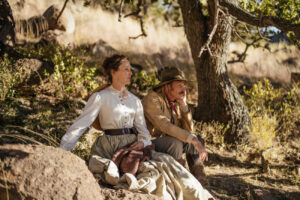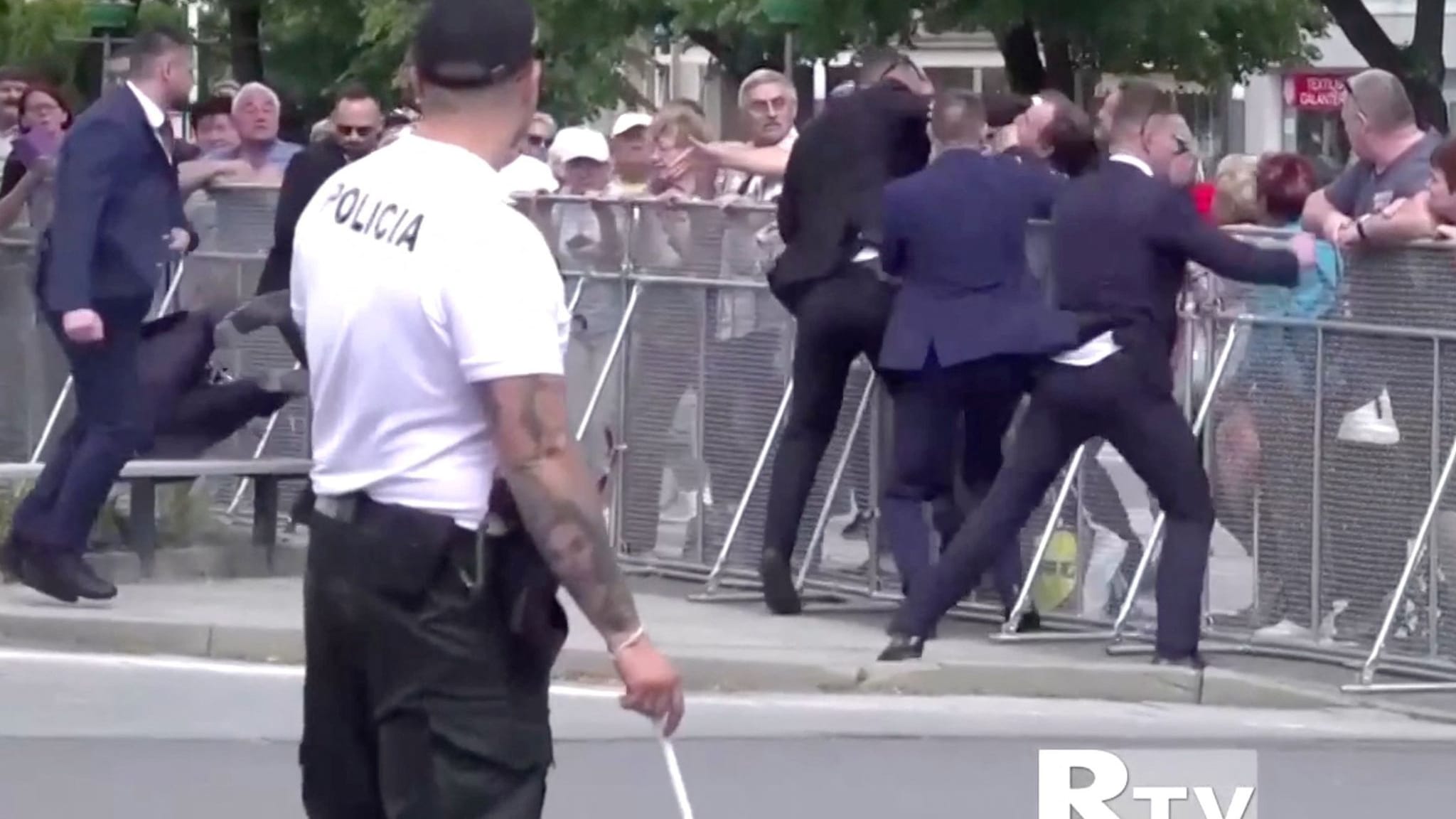Vicky Krieps plays the gentle Vivienne, a strong, independent woman, and Viggo Mortensen plays Olsen, a Danish ex-serviceman. “Vicky is able to convey a lot in silences, so it was great to have her,” confides the actor-director.
An international star, the actor-director came to the Rencontres du Cinéma de Gérardmer to present his film “Jusqu’au bout du monde”, a beautiful romantic western starring Vicky Krieps. “I thought it was interesting to set the story of a free, independent woman in the western United States in the 19è century, where society was a bit savage, dominated by men,” confides Viggo Mortensen.
“I’ve never seen anything like it, it’s beautiful here,” exclaimed Viggo Mortensen from the Manoir du Lac in Gérardmer, enjoying a superb view of the lake and the Vosges forest. A little later, the actor-director’s appearance triggered a standing ovation at the Rencontres du Cinéma de Gérardmer, where delighted spectators had just previewed his film “Jusqu’au bout du monde” (out May 1). A great coup for the Vosges town and the organizers of the Rencontres du Cinéma, who had concocted the pleasant surprise of welcoming this internationally renowned star, particularly since his portrayal of Aragorn in the “Lord of the Rings” saga.
Also seen in four films by David Cronenberg, in “Captain Fantastic”, “The Road”, “Green Book”… Viggo Mortensen turned to directing with “Falling”. “Till the End of the World”, his second film as director, is dedicated to his mother; citing the great masters of the genre, Howard Hawks and John Ford, as references, he has shot a fine old-fashioned western in form. But a romantic western, with Vicky Krieps as the gentle Vivienne, a strong, independent woman who is discovered dying at the beginning of the film, a tear streaming down her face.
It was on the port of San Francisco that Vivienne, a young Quebec florist, met Olsen, a Danish ex-serviceman played by Viggo Mortensen. The two decide to travel together to the ends of the earth, to an isolated house in Nevada, near a small town under construction run by a corrupt mayor, an influential businessman, a psychopathic cowboy… He works as a carpenter and she works in the saloon, when she’s not growing flowers in the middle of the desert. But their happy start to life together is interrupted when Olsen decides to enlist in the army and take part in the American Civil War, leaving Vivienne alone in this part of the world.
If Joan of Arc is evoked in his film, it’s not so far from Domrémy-la-Pucelle, in Gérardmer, that Viggo Mortensen gave a press conference, answering in a soft voice and in French.
“I wanted to be faithful to the true history of the United States”
There’s a lot of nostalgia in your film. Were you nostalgic for the Western?
Viggo Mortensen: I don’t know if it’s nostalgia, but it’s true that I grew up like a lot of boys of my generation with Westerns, on TV, in the cinema, it was the end of the golden age of the Western in my childhood. I love the genre in general, even though I know that most Westerns aren’t very original or well conceived – it’s the same in any genre. I learned to ride when I was four, and it was at that age that my mother took me to the cinema, and I saw westerns and other films too. I thought it was interesting to set the story of a free, independent, somewhat stubborn woman in a time and place – the American West in the 19th century – where society was a bit savage, outlawed and dominated by men.
A Dane and a Québécoise, Olsen and Vivienne, your two main characters, are migrants in the Wild West…
In the first fifty years of cinema history, over 7,000 Westerns were made, and it’s always more or less the same story. It’s a mythology, the imagination of the United States, the growth of the country, the opening of the frontier, but it’s not often that we see main characters who are foreigners, who are not Anglo-Saxons. I wanted to show the truth, to be faithful to the real history of the United States, it was like that, it was a mixture of people, accents, nationalities, races…
They’re both looking for paradise?
Yes, it starts like that, it’s a paradise for them, that’s the idea, they’re happy together. It’s the story of a woman and it’s also a love story between two people who are a little different, both independent, both stubborn, it’s the story of a relationship of trust. Forgiveness at the end is more important than revenge, than violence, it’s different from what you see in a classic western. I wanted the way of making the film, the way of seeing what’s going on, to be in the tradition of the classic western: the image is simple, elegant, you can see the characters in the landscapes, the music is period, the whole team made a great effort to ensure that everything you see is correct within a classic framework.
“I have great respect for the spectator”
Viggo Mortensen at Gérardmer: “The image that came to me was of a little girl playing alone in the forest, just like my mother experienced as a child.
Joan of Arc is an important figure for Vivienne, an exceptional figure in a Western…
In the scene between her and her mother, her mother reads her a book about Joan of Arc in 1838, a book I found in France, published in 1817; it seemed logical to me for a French-speaking family, on the Canadian border in the eastern United States, it was normal for the imagination of this special girl who grows up with Joan of Arc as her idol, she’s different.
Vivienne is a warrior in her own way…
Yes, free, independent, stubborn. The image that came to me was of a little girl playing alone in the forest, like my mother experienced as a child in the northeastern United States. I started with that, I didn’t know where the story was going to end, I decided that it was in the 19th century, and that when she grew up this girl would go to the West of the United States, I wanted to show the effects of things before the causes, that’s why I start with Vivienne at the end of her life.
The film’s narrative is specific in that your two characters disappear from the story in turn?
I have a great deal of respect for the viewer, and I think it’s interesting to try and do something in the first fifteen or twenty minutes of a film to try and attract the viewer’s interest. I don’t like to underline everything, to tell everything, I made the film for myself, for a viewer to be honest. As a spectator, I like going to the cinema, and if I like what I see at the beginning, I like trying to participate; at the end, if it’s a good film it’s my film, it’s my interpretation of what I saw, my feeling at the end of the session, and that’s what I want to do for others. I’m very conscious of the fact that when you see the film, it’s your film, not my film. I’ve made a film for myself, and I hope that other people will be a little interested in it, but they’ll have different ideas from mine.
As an audience member, do you condemn the character you play for going off to war?
He had his reasons, as little Vivienne’s mother says, men fight and they have their reasons. They’re moral reasons, he thinks he should do it, she doesn’t agree, but it’s a relationship of trust, he doesn’t lie. When he comes back from the war, he thinks it was a mistake, it’s up to him to accept to evolve, to accept the new situation, it’s important to forgive, to forgive himself and to forgive the other.
How do you explain the need for men to always go to war?
They’re men!
“Cinema is a total universe of the arts”
“It’s true that, like many boys of my generation, I grew up with Westerns,” confides Viggo Mortensen.
Why did you choose Vicky Krieps to play Vivienne?
When I finished writing the script, I thought of her immediately. I didn’t know her, but I’d seen her work, so I thought I could believe she was from the 19th century, she had a talent, a presence in front of the camera, I’d seen that in her films, she’s able to convey a lot in silences, for example, to convey through her skin what she feels or thinks. It’s a quality I’d seen in Meryl Streep’s work at the start of my career as an actor. I thought that if she could do this character, we had the opportunity to create a beautiful film with a free woman at the center of the story, and it was great to have her.
You didn’t write the role of Olsen for yourself, so who were you thinking of casting, and what made you decide to play it?
I prefer not to name names, it’s not important, the film is the film and that’s that. It’s not what I’d imagined at first, but shortly before we went to Mexico to prepare the shoot, it was too late to lose the main character. We tried to find another actor, of the same age, same type, acceptable to the producers, I tried with three actors, but they just weren’t available, even if they liked the story and the idea of playing Vicky. I thought that if we didn’t do it now, we’d never do it, and besides, I had a team, actors who were available, we’d started preparing the sets, we had to make the film. I told the producers that I could do it, but that I’d have to change certain things about the character, who was older than I’d imagined. I phoned Vicky and she told me she thought it was a good idea.
Is it because you wanted to control everything about the film that you’re a writer, director, actor, musician and co-producer all rolled into one?
I never stop working, but it’s always a collective effort, and that’s what I love about cinema. I’m the director, but I listened to my team, the other actors, and we told the story together. The script is the only thing I did alone, but I shared the first version with two friends who are also scriptwriters and directors, to see if they had any ideas or suggestions. It’s always a collaboration, and that’s what I like about cinema, it’s a total universe of the arts.
Your first film as a cinematographer was “Falling”, released in 2020. Why did you come to directing so late?
I wanted to do it before, I had a script, a Scandinavian story, it was thirty-five years ago, I had found some of the money to shoot, but not enough, and I left it because I started working more as an actor. But maybe it’s good that I had to wait, because in the end I learned a lot over decades, with great directors; at that time, I hadn’t yet worked with Jane Campion, David Cronenberg, Peter Jackson… I learned a lot during that time, so maybe it’s better.
Interview by Patrick TARDIT
“From Here to the End of the World, a film by Viggo Mortensen starring Vicky Krieps (out May 1).
L’article Viggo Mortensen: “I grew up with Westerns”. est apparu en premier sur FrenchDailyNews.





